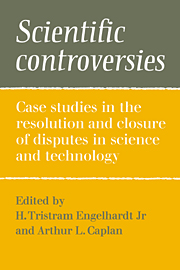 Scientific Controversies
Scientific Controversies Book contents
- Frontmatter
- Contents
- Preface
- List of contributors
- Introduction: Patterns of controversy and closure: the interplay of knowledge, values, and political forces
- PART I THEORETICAL PERSPECTIVES
- 1 Ethical theory and the problem of closure
- 2 Scientific controversy and its termination
- 3 The political anatomy of controversy in the sciences
- 4 Controversies involving science and technology: a theoretical perspective
- 5 Politics, public policy-making, and the process of reaching closure
- 6 The role of experts in scientific controversy
- 7 The continental drift debate
- 8 How history and politics affect closure in biomedical discussions: the example of the Soviet Union
- 9 Scientific disputes over policy
- 10 Controversies and the authority of science
- 11 Post-Skinner and post-Freud: philosophical causes of scientific disagreements
- PART II CONTEMPORARY CASE STUDIES
- PART III CONTROVERSY, CLOSURE, AND THE PUBLIC
- Author index
- Subject index
2 - Scientific controversy and its termination
Published online by Cambridge University Press: 03 February 2010
- Frontmatter
- Contents
- Preface
- List of contributors
- Introduction: Patterns of controversy and closure: the interplay of knowledge, values, and political forces
- PART I THEORETICAL PERSPECTIVES
- 1 Ethical theory and the problem of closure
- 2 Scientific controversy and its termination
- 3 The political anatomy of controversy in the sciences
- 4 Controversies involving science and technology: a theoretical perspective
- 5 Politics, public policy-making, and the process of reaching closure
- 6 The role of experts in scientific controversy
- 7 The continental drift debate
- 8 How history and politics affect closure in biomedical discussions: the example of the Soviet Union
- 9 Scientific disputes over policy
- 10 Controversies and the authority of science
- 11 Post-Skinner and post-Freud: philosophical causes of scientific disagreements
- PART II CONTEMPORARY CASE STUDIES
- PART III CONTROVERSY, CLOSURE, AND THE PUBLIC
- Author index
- Subject index
Summary
Writing in 1921, Norman Campbell answered the question posed in the title of his book What Is Science? with the succinct definition: “Science is the study of those judgements concerning which universal agreement can be obtained”. Two possible objections occurred to him. The first was that “it is notorious that men of science differ among themselves” just as acrimoniously as philosophers and linguists do. He replies:
I do not say that all the propositions of science are universally accepted – nothing is further from my meaning; what I say is that the judgements which science studies and on which its final propositions are based are universally accepted. Difference of opinion enters not with the subject-matter, but with the conclusions that are based on them.
A second objection is that if universal agreement is a necessary condition for the subject matter of science, “a single cantankerous person … could overthrow the whole fabric of science.” His response to this is that such a challenge could come only if the person were lying or suffering from hallucination or sensory defect. After a discussion of these different possibilities, he concludes with some satisfaction:
It is a very remarkable fact that [in such cases] we can always find a test which … enables us to restore universal agreement. It is this fact, which could not be anticipated, which makes science possible, and gives its great importance to the test of universal agreement.
My reason for beginning with Campbell is not to make his view of science a focal point of discussion in this essay.
- Type
- Chapter
- Information
- Scientific ControversiesCase Studies in the Resolution and Closure of Disputes in Science and Technology, pp. 49 - 92Publisher: Cambridge University PressPrint publication year: 1987
- 49
- Cited by


